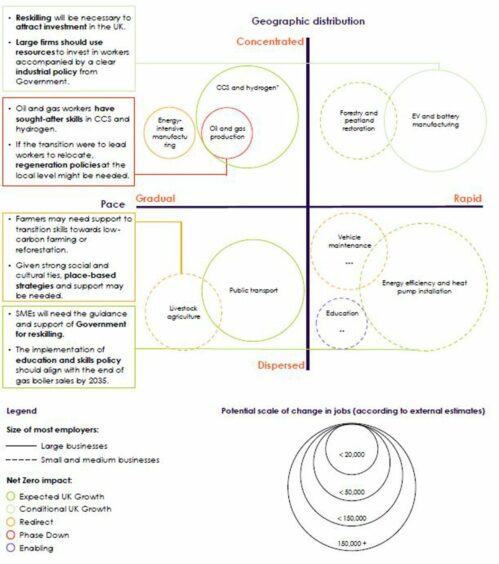
The Climate Change Committee finds that most workers will see no major impact from the UK’s drive for net zero, but “targeted intervention” is needed in Scotland and Wales.
In a new briefing on green jobs and the UK economy, the CCC says that the majority of workers will see “no major impacts” from the transition towards net zero.
Indeed, the transition should offer “significant net employment creation” across the country, with estimates suggesting between 135,000 and 725,000 net new jobs would emerge in low-carbon sectors such as buildings retrofitting, renewable energy generation and electric vehicles.
However, it warns that around 15,000 jobs may be lost across the country by 2030 as roles related to North Sea oil and gas extraction decline and calls for specific support to ensure there are not outsized local impacts.
Less than 1% of workers face declines
The CCC says around a quarter of a million jobs have already been created in the transition, but that all workforce opportunities can only be realised with stronger policies to maximise potential and minimise risks.
The briefing incorporates findings from nearly 30 reports, including work by the ECITB and Robert Gordon University.
Those sectors expected to see major change on the road to net zero represent around one-fifth of the current total workforce, and two thirds of these workers are poised for growth – especially in roles related to buildings and retrofit and EV battery manufacturing.
Around 7% of UK workers are in sectors that will gradually redirect their products and services transition from the use of fossil fuels to low-carbon methods, including cement and steel.
Less than 1% of UK workers are in sectors likely to face declines over the transition, including in oil and gas extraction and coal, with the CCC foreseeing around 15,000 net job losses amongst this cohort as a result of shrinking production by 2030.
The majority of these workers are in Scotland or Wales – which together account for around 63% of all oil and gas jobs – and are “particularly concentrated” in Aberdeenshire.
It cautions that this could have an impact on local communities that rely on high-income jobs within the sector.
However, the CCC reiterates that even these changes are expected to be gradual – provided they are adequately planned for – and that workers’ skills are likely to be in demand as other sectors grow, particularly in wind, CCS and hydrogen.
“Given the geographical concentration of workers there may be a risk of disruptive localised impacts, notably in Scotland where these jobs are mostly concentrated, without targeted intervention,” it says.
For that reason, it says a “hands-off approach” to the workforce from government “will not work.” Jobs growth is not guaranteed and will require “active reskilling and upskilling” and government support in key areas.
International competition
It also warns of a risk to the UK’s international competitiveness in the face of the US Inflation Reduction Act (IRA) and the EU’s proposed Green Deal, in particular the dangers posed by a lack of skills that could help attract investment to the UK.
It notes areas such as EV and battery production face major competitive pressure as countries rush to offer new subsidies for inland manufacturing.
Accordingly, it warns that the UK “must defend its competitive advantage” in sectors like hydrogen and carbon capture.
Lord Deben, chairman of the Climate Change Committee said: “The UK has committed to Net Zero. The only question is whether the Government intends to get there in a way that benefits workers or leaves them behind.
“This is a unique moment to tailor our approach to skills and jobs, in the certainty of achieving the legal goal. A Net Zero workforce means secure employment for the future. This is an opportunity for the Government to bring real meaning to ‘levelling up’.”
It follows similar warnings issued by Scottish First Minister Humza Yousaf who said without “urgent change”, the UK would fall behind its international competitors and risked “throwing away the transformational green opportunities available to Scotland.”
It also comes as Scottish Government figures increase pressure on Westminster to match their £500m targeted Just Transition fund aimed at the north east and Moray.
No more ‘scaremongering’ on net zero jobs
Greenpeace policy director Doug Parr added: “This report thoroughly rejects any scaremongering that the net zero transition will be bad for UK jobs. In fact, it demonstrates the huge potential for hundreds of thousands of new roles in low carbon sectors.
“But our economy won’t benefit without the right government assistance for workers who need retraining, and sectors that need support. It must prioritise working with the communities most affected to attract new employment as the old jobs disappear.
“The government must show it matches the drive, policy and green finance shown by the US, China and the EU otherwise we will continue to lag behind in the international race on clean tech.”
Recommended for you

 © Supplied by Climate Change Commi
© Supplied by Climate Change Commi